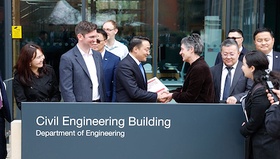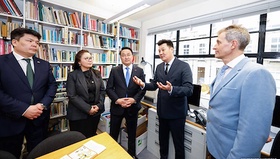The two-day international conference on “Democratic Challenges in Asia and Mongolia: Innovations Through Deliberative Democracy, Virtual Parliament and Electoral Reform” was virtually organized and concluded on January 29, 2021.
The meeting was organized by Stanford University in collaboration with the National University of Mongolia, where the Chairman of the State Great Hural (Parliament) of Mongolia G.Zandanshatar and Member of Parliament Ts.Munkhtsetseg have participated in the meeting by delivering welcoming remarks.
In his welcoming remarks, Speaker of Parliament G.Zandanshatar noted that Mongolia has successfully amended its Constitution on November 14, 2019 using deliberative polling in the process, which was perhaps the first ever case among the modern nations used this mechanism for amending its Constitution. The deliberative poll was a critical part of the process of consultation and discourse that helped shaping the final amendments. Moreover, when the pandemic hit, Mongolia was one of the first countries that swiftly introduced amendments to its parliamentary procedures, which allowed the parliament to work either fully online and/or semi-online formats. The full online format provides MPs to participate via their individual computers or tablets using specific online discussion, registration and vote counting applications, whereas the semi online format allows MPs to attend the parliament palace physically with requirements of attending sessions from 5 separate chambers keeping 1.5-meter distance, connecting with video conferencing system and voting either by show of hands or by built-in software.
These were important in three ways. First, as the representatives elected by voters, MPs are willing and ready to serve even under restricted period. Second, should the needs require, the parliament would consider any bills in expedited procedure and still carry out its mandate without transferring all its legislative power to the executive branch. Third, the parliament was able to conduct its oversight function in case of serious and systematic violations of human rights and democratic values.
He also emphasized that Mongolia has set itself the goal of becoming an e-Parliament as part of parliamentary reform, and in the frameworks, launched an electronic system that involves citizens, civil society organizations, and academics in the drafting and discussing the bills.
On the second-day meeting, MP Ts.Munkhtsetseg expressed her position on political party reform in Mongolia. She stressed, ‘Authoritarian tendency and expansion of populism and nationalism around the globe that have progressing in recent years are posing serious challenges to the global democratization process and political parties. Under this circumstance, the constitutional amendments approved in November 2019, were able to consolidate parliamentary system, bearing a long-term positive result for the democratic consolidation in Mongolia. One of the laws to be enacted under the Constitutional amendments is the Law on Political Parties. The Constitutional amendments include important provisions for political parties to pursue policy throughout the country and for open and transparent sources of funding. According to this concept, the State Great Hural (Parliament) is to renew the Law on Political Parties and the Law on Political Party Financing that will make a significant contribution to strengthening democracy in Mongolia.’

 Eng
Eng  Монгол
Монгол

